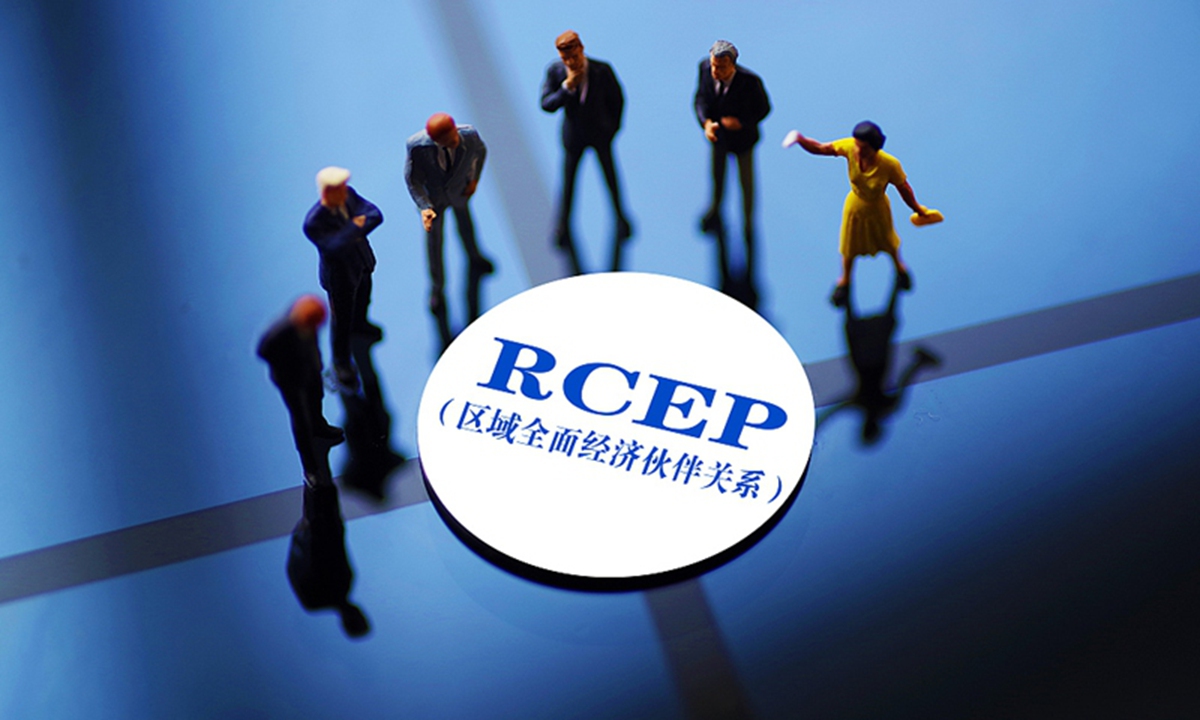
RCEP Photo: Xinhua
The Regional Comprehensive Economic Partnership (RCEP) that came into effect on January 1 includes China, Japan, and South Korea into the same free trade framework for the first time. In 2020, China, Japan, and South Korea ranked as the second, third and 10th largest economies in the world. The total economic volume of the three Northeast Asian countries far exceeds that of the Eurozone and is comparable to the North American Free Trade Zone. Within RCEP, the three economies together take a weight of 82 percent, playing a vital role.
These three economies have maintained close economic and trade relations for a long time. Yet, the political relationships among them are turbulent due to historical and real-world contradictions, at times impeding the process of their integration. In the post-pandemic era, China, Japan and South Korea can seize the opportunity to work together to deepen mutually beneficial cooperation under the RCEP framework.
First, the three countries can continue work for faster trade and investment facilitation. In 2021, trade among China, Japan and South Korea grew despite pandemic impacts, and the three pairs of bilateral trade are expected to hit record highs, highlighting the high economic interdependence of the three economies. After the RCEP takes effect, China, Japan and South Korea can make good use of tariff reduction and exemption measures and investment facilitation arrangements to promote economic recovery.
Second, the three countries can upgrade economic cooperation. The construction of the China-Japan-Korea Free Trade Area has gone through many years of negotiations, but it still needs a push. The three countries can take the effective small multilateral free trade arrangement to play the role of ballast for the large multilateral framework of RCEP.
Third, the three countries can work together to improve the resilience and vitality of the East Asian industrial chain. The COVID-19 pandemic has created a greater impact on the regional industrial chain and supply chain. Under the framework of RCEP, the three countries need to pivot toward closer cooperation with ASEAN economies, focus on the long-term prosperity and sustainable development of the entire Asia-Pacific region, and jointly promote reorganization and perfection of the regional industrial supply chain and work for common prosperity of the whole region.
Beijing has proposed that China, Japan and South Korea jointly deepen third-party investment cooperation with ASEAN economies, continue to promote the establishment of a China-Japan-Korea joint investment fund, and explore the establishment of a China-Japan-Korea ASEAN investment cooperation platform. This requires the active cooperation of Japan and South Korea. In addition, the three countries can also actively explore the docking of their respective foreign cooperation initiatives. China's Belt and Road Initiative, Japan's "Partnership for Quality Infrastructure" and South Korea's "New Southern Policy" can act as a mutual consultation mechanism within the RCEP framework.
More importantly, the three countries need to update their thinking so that RCEP can play the role of "improving political relationship through economic cooperation" in the new era.
In the process of East Asian cooperation, Japan once played the leading role in promoting the economic development of East Asia. With the rise of China's economy, some people in Japan hold a complicated mentality about RCEP with China's participation. These people tend to prevent China from forming a so-called "dominant" position in the free trade zone, while trying to lure other countries to "slow down China." This approach of "politicizing" regional economic cooperation will not help regional economic recovery and growth.
In today's profound evolution of the global economic structure, China's status in the regional economy is by all metrics positive and beneficial for all partners. After China, which has a huge consumer market, joins, RCEP will only bring greater business opportunities to the partnering economies.
Although RCEP is not the highest level of regional free trade arrangements, it embodies the characteristics of an inclusive and diverse Asia-Pacific region.
Amid the anti-globalization and protectionist trends spearheaded by the US, the spirit of seeking common ground while reserving differences and win-win cooperation is precious. Countries need to abandon the outdated thinking about the dominance of the regional order, and join hands to contribute to the prosperity and development of the region in the post-pandemic era. This is the responsibility of regional economic powerhouses.
The author is a research fellow at the China Institute of International Studies. bizopinion@globaltimes.com.cn




